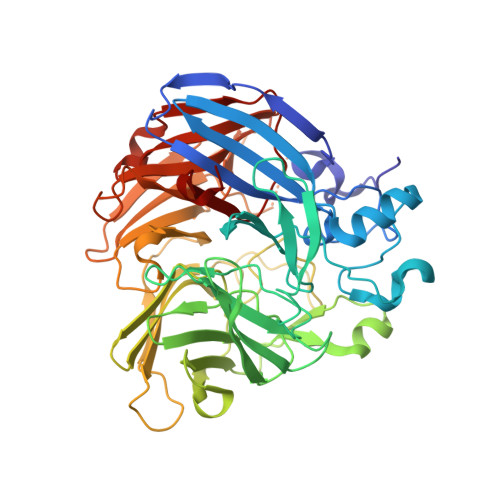Identification of functionally important residues and structural features in a bacterial lignostilbene dioxygenase.
Kuatsjah, E., Verstraete, M.M., Kobylarz, M.J., Liu, A.K.N., Murphy, M.E.P., Eltis, L.D.(2019) J Biological Chem 294: 12911-12920
- PubMed: 31292192
- DOI: https://doi.org/10.1074/jbc.RA119.009428
- Primary Citation of Related Structures:
6OJR, 6OJT, 6OJW - PubMed Abstract:
Lignostilbene-α,β-dioxygenase A (LsdA) from the bacterium Sphingomonas paucimobilis TMY1009 is a nonheme iron oxygenase that catalyzes the cleavage of lignostilbene, a compound arising in lignin transformation, to two vanillin molecules. To examine LsdA's substrate specificity, we heterologously produced the dimeric enzyme with the help of chaperones. When tested on several substituted stilbenes, LsdA exhibited the greatest specificity for lignostilbene ( k cat app = 1.00 ± 0.04 × 10 6 m -1 s -1 ). These experiments further indicated that the substrate's 4-hydroxy moiety is required for catalysis and that this moiety cannot be replaced with a methoxy group. Phenylazophenol inhibited the LsdA-catalyzed cleavage of lignostilbene in a reversible, mixed fashion ( K ic = 6 ± 1 μm, K iu = 24 ± 4 μm). An X-ray crystal structure of LsdA at 2.3 Å resolution revealed a seven-bladed β-propeller fold with an iron cofactor coordinated by four histidines, in agreement with previous observations on related carotenoid cleavage oxygenases. We noted that residues at the dimer interface are also present in LsdB, another lignostilbene dioxygenase in S. paucimobilis TMY1009, rationalizing LsdA and LsdB homo- and heterodimerization in vivo A structure of an LsdA·phenylazophenol complex identified Phe 59 , Tyr 101 , and Lys 134 as contacting the 4-hydroxyphenyl moiety of the inhibitor. Phe 59 and Tyr 101 substitutions with His and Phe, respectively, reduced LsdA activity ( k cat app ) ∼15- and 10-fold. The K134M variant did not detectably cleave lignostilbene, indicating that Lys 134 plays a key catalytic role. This study expands our mechanistic understanding of LsdA and related stilbene-cleaving dioxygenases.
- Genome Science and Technology Program, The University of British Columbia, Vancouver V6T 1Z3, Canada.
Organizational Affiliation:


















